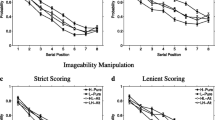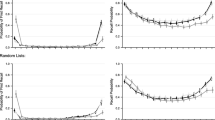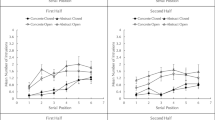Summary
In a free recall task it was demonstrated systematically that the evocation of a short list of unrelated words, individually presented, was in the majority of cases in conformity with the presentation order. This spontaneous recall in presentation order is called the capacity for sequential evocation (CSE). The CSE has a mode of four word units, though individual variation in its range does exist. In the present study it was shown that the introduction of frequently used words into a list (two in either initial, middle, or final positions) leads to most increase in recall in presentation order when they are placed in the initial positions. To create a situation of uncertainty with respect to strategies for information intake, lists of four words were mixed with lists of six and eight words with or without frequent words. Results confirm a theoretical perspective stipulating that the decay in the activation of response schemas (phonological and articulatory) will have the least adverse effect on recall performance when the level of activation is greatest (in proportion to the frequency of word use).
Similar content being viewed by others
References
Anderson R, Bower GH (1973) Human associative memory. John Wiley & Sons, New York
Binet A, Henri V (1894) La mémoire des mots, la mémoire des phrases. Année Psychol 1:1–59
Broadbent DE (1957) A mechanical model for human attention and immediate memory. Psychol Rev 64:205–215
Broadbent DE (1958) Perception and communication. Pergamon Press, New York
Broadbent DE, Vines R, Broadbent M (1978) Recency effects in memory as a function of modality of intervening events. Psychol Res 40:5–13
Brown J (1958) Some tests of the decay theory of immediate memory. Q J Exp Psychol 10:12–21
Cavanagh JP (1972) Relation between the immediate memory span and the memory search rate. Psychol Rev 79:525–530
Conrad R (1957) Decay theory of immediate memory. Nature 179:831–832
Conrad R (1964) Acoustic confusions in immediate memory. Brit J Psychol 55:75–84
Crowder RG, Morton J Pre-categorical acoustic storage (PAS). Percept Psychophys 5:365–373
Fraisse P (1944–45) Étude sur la mémoire immédiate III. L'influence de la nature de présentation et de la place des éléments. La nature du présent psychologique. Année Psychol 45–46:29–42
Fraisse P (1976) Qu'est-ce qui limite l'empan mnémonique? Année Psychol 76:25–38
Fraisse P, Smirnov S (1976) Response latency and the content of immediate memory. Bull Psychonom Soc 8:345–348
Kahneman D (1979) Attention and effort. Prentice-Hall, Englewood Cliffs, NJ
Klapp ST (1976) Short term memory as response preparation state. Mem Cognit 4:721–729
Lee CL, Estes WK (1977) Order and position in primary memory for letter strings. J Verb Learn Verb Behav 16:395–418
Lieury A (1980) Les processus de récupération de la mémoire: des indices de récupération à la datation des souvenirs. Thèse, Doctorat d'État, Paris
Morton J (1979) Word recognition. In: Morton J, Marshall L (eds) Structures and processes in psycholinguistics, Series 2, Paul Elek, London, pp 107–156
Murdock BB (1976) Methodology in human memory. In: Estes WW (ed) Handbook of learning and cognitive processes. Volume IV, Attention and memory. Lawrence Erlbaum, Hillsdale, NJ, pp 131–191
Neisser RU (1967) Cognitive psychology. Appleton Century Crofts, New York
Nilsson LG, Ohlsson K, Ronneberg J (1979) Processing and storage explanation of the modality effect. Acta Psychol 44:41–50
Nilsson LG, Wright E, Murdock BB (1975) The effects of visual presentation method of an single-trial free recall. Mem Cognit 3:427–433
Nilsson LG, Wright E, Murdock BB (1979) Order of recall, output interference, and the modality effect. Psychol Res 41:63–78
Oléron G, Lenfant N, Degouys J (1972) Étude des modifications des stratégies d'acquisition mnémonique. Communication in Meeting on Recent Advances in Learning Psychology. Frascati, 25–30 Sept.
Oléron G (1975) Mémoire à court terme et rang d'évocation des résponses. Communication à la société Française de Psychologie
Oléron G (1976) Capacité d'évocation séquentielle et les mécanismes de la mise en mémoire. Communication du XXXIème Congrès International de Psychologie. Paris
Oléron G (1978) Latence des résponses dans l'évocation immédiate de brèves séries de mots. Année Psychol 78:61–78
Oléron G (1980) Is there a span of sequential evocation? J Psycholinguist 6:5–26
Pynte J (1973) Prononciation implicite du stimulus et production d'hypothèses perceptives au cours de la perception visuelle. Année Psychol 73:57–83
Richardson JTE (1979) Precategorical acoustical storage and postcategorical lexical storage. Cognit Psychol 11:265–286
Rowe JE, Clark LJ (1977) Retention of order information for sounds and words. Can J Psychol 31:14–23
Shiffrin RM (1976) Capacity limitations. In: Estes WK (ed) Handbook of learning and cognition Processes Volume IV, Attention and Memory. Lawrence Erlbaum, Hillsdale, NJ, pp 177–236
Sumby WH (1963) Word frequency and the serial position effect. J Verb Learn Verbal Behav 1:443–450
Watkins MJ (1977) The intricacy of the memory span. Mem Cognit 5:529–534
Watkins OC, Watkins MJ (1977) On serial recall and the modality effect: Effects of word frequency. J Exp Psychol: Hum Learn Mem 3:712–713
Wickelgren WA, Norman DA (1966) Strength models and serial position in short term recognition memory. J Math Psychol 3:316–347
Author information
Authors and Affiliations
Additional information
Associated with the Laboratoire de Psychologie Expérimentale de l'Université René Descartes, Associate Laboratory of Centre National de la Recherche Scientifique, 28 rue Serpente, 75006 Paris, France
Rights and permissions
About this article
Cite this article
Oléron, G., Tardieu, H. The capacity for sequential evocation and the influence of frequency of word use. Psychol. Res 44, 13–27 (1982). https://doi.org/10.1007/BF00308552
Received:
Issue Date:
DOI: https://doi.org/10.1007/BF00308552




